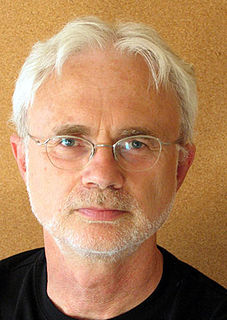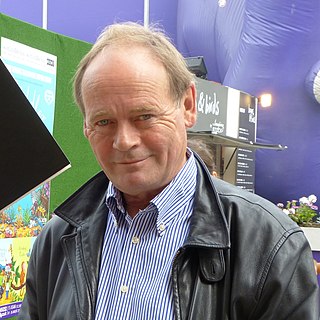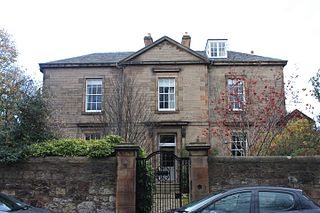This page is based on this
Wikipedia article Text is available under the
CC BY-SA 4.0 license; additional terms may apply.
Images, videos and audio are available under their respective licenses.

John Coolidge Adams is an American composer, clarinetist, and conductor of classical music and opera, with strong roots in minimalism.

St John's College is a constituent college of the University of Cambridge. The college was founded by Lady Margaret Beaufort. In constitutional terms, the college is a charitable corporation established by a charter dated 9 April 1511. The aims of the college, as specified by its statutes, are the promotion of education, religion, learning and research.

Dirk Gently's Holistic Detective Agency is a humorous detective novel by English writer Douglas Adams, first published in 1987. It is described by the author on its cover as a "thumping good detective-ghost-horror-who dunnit-time travel-romantic-musical-comedy-epic".

The Pulitzer Prize for Biography is one of the seven American Pulitzer Prizes that are annually awarded for Letters, Drama, and Music. It has been presented since 1917 for a distinguished biography, autobiography or memoir by an American author or co-authors, published during the preceding calendar year. Thus it is one of the original Pulitzers, for the program was inaugurated in 1917 with seven prizes, four of which were awarded that year.

John Hardress Wilfred Lloyd is an English television producer and writer best known for his work on such comedy television programmes as Not the Nine O'Clock News, Spitting Image, The Hitchhiker's Guide to the Galaxy, Blackadder and QI.

John Couch Adams was a British mathematician and astronomer. He was born in Laneast, near Launceston, Cornwall, and died in Cambridge.

St. Cedd's College is a fictional college, created by Douglas Adams, of Cambridge University.
It appears in the Doctor Who serial Shada, and in the novel Dirk Gently's Holistic Detective Agency.

Sir William Vallance Douglas Hodge was a British mathematician, specifically a geometer.

The Founding Fathers of the United States, or simply the Founding Fathers, were a group of philosophers, politicians, and writers who led the American Revolution against the Kingdom of Great Britain. Most were descendants of colonists settled in the Thirteen Colonies in North America.

The Adams family was a prominent political family in the United States from the late 18th through the early 20th centuries. Based in eastern Massachusetts, they formed part of the Boston Brahmin community. The surname Adams stems from Henry Adams of the county of Somerset in Great Britain.
Black Cinderella Two Goes East was a radio pantomime broadcast on BBC Radio 2 on 25 December 1978. The programme is notable for being one of only a few radio programmes (co)-produced by Douglas Adams while he was employed by the BBC as a radio producer, also for giving a significant role to a serving politician, John Pardoe. The hour-long programme was written by Clive Anderson and Rory McGrath and was co-produced by Douglas Adams and John Lloyd.
Samuel Flagg Bemis was an American historian and biographer. For many years he taught at Yale University. He was also President of the American Historical Association and a specialist in American diplomatic history. He was awarded two Pulitzer Prizes. Jerald A. Combs says he was "the greatest of all historians of early American diplomacy."

Richard George Adams was an English novelist and writer of the books Watership Down, Shardik and The Plague Dogs. He studied modern history at university before serving in the British Army during World War II. Afterwards, he completed his studies, and then joined the British Civil Service. In 1974, two years after Watership Down was published, Adams became a full-time author.

The James Clerk Maxwell Medal and Prize is awarded annually by the Institute of Physics to recognize outstanding early-career contributions to theoretical physics. Named after James Clerk Maxwell, the medal is made of bronze and accompanied by a prize of £1000.

Richard John Samworth is the Professor of Statistical Science and the Director of the Statistical Laboratory, University of Cambridge, and a Teaching Fellow of St John's College, Cambridge. He was educated at St John's College, Cambridge. His main research interests are in nonparametric and high-dimensional statistics. Particular topics include shape-constrained density estimation and other nonparametric function estimation problems, nonparametric classification, clustering and regression, the bootstrap and high-dimensional variable selection problems.
John Paul Hanlon (1913-1968) was an Irish Roman Catholic priest and painter.
Jack Hanlon was born in Templeogue, Dublin on May 6, 1913. He educated at Belvedere College and went on to study for the priesthood in 1932 at Clonliffe College while also studying at UCD, and studied painting in Belgium, Spain and he won a scholarship to study in Paris under André Lhote.
He completed his clerical training at Maynooth and was ordained priest at St. Patrick’s College, Maynooth in 1939.













